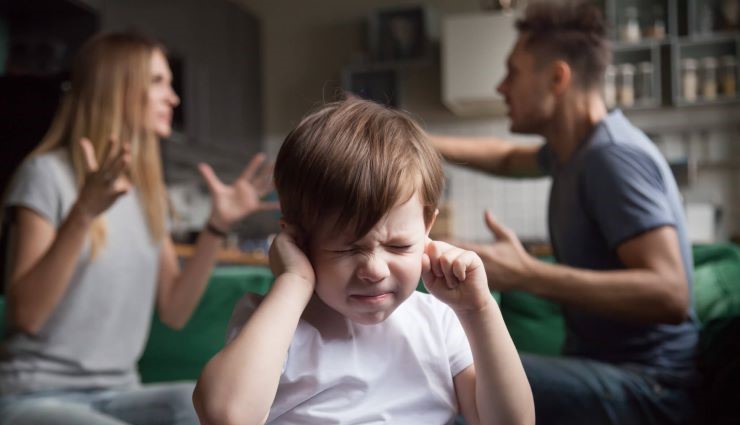16 recommendations to reduce the adverse effects of divorce on children

Divorce is not easy for anyone, especially for children. Children can adapt to new situations. Still, you need to keep some points in mind to facilitate this. A wrong move by the parents is enough for the child to be involved in a trauma that will be a nightmare for the rest of his life. Your situation during the divorce may need to be more favorable. Still, you need to support your child well during this difficult time. Show them that you are there for them no matter what and that you accept their feelings. In the following, we provide solutions that reduce the damage caused by divorce to children, so stay tuned.
1. Understand the situation completely.
Before taking any action, you need to think deeply about why you got married and need to separate from each other. By visiting a psychologist and couples’ therapist, you will better understand the reason for your divorce. Using the experience of other people who have gone through the divorce process is also suggested. If you are aware of the consequences of divorce, you will be more sure of your decision and go through the difficult path of divorce more quickly. Also, you will learn the correct way to communicate with the child and explain the problem to him.
2. Think about the future.
Be sure to try different ways, such as temporary separation, before the final decision of divorce. This will familiarize the child with the situation and be a good opportunity for you and your partner to understand the situation better.
3. Provide a familiar and comfortable environment.
Try to be close to each other as much as possible after the breakup. For example, they live in separate houses in the same neighborhood, not far from each other. In this way, your children will feel less distance and separation. Also, pay attention to the details of the home environment. Try to provide an environment where the child feels comfortable. For example, he leaves his favorite toys, blankets, and comforters in his new home.
4. Set clear and firm frameworks.
Setting appropriate frameworks for both parents and children is essential. You and your ex-spouse have to start separate and new lives, and at the same time, you have to make sure that your child feels safe. The child should not think that his situation is unstable and that he does not know where he belongs. One of the appropriate solutions for this problem is to determine a rigid schedule for meeting each other that the parents adhere to. Note that this program should become a routine in the child’s life so that questions such as “Will I sleep with mommy or daddy tonight?” It will not happen to him.
5. Use a standard bank card.
One of the common arguments between separated couples is about children’s expenses. List all the costs that should be paid jointly to avoid this issue. A better solution is to consider a joint bank card and pay your child’s expenses.
6. Remember to consider the importance of communication with each other.
If your daily communication leads to arguments and fights, it is better to consider a solution to reduce this communication. For example, you can make a fixed schedule and consider days to get together and do activities with your children. In this way, you have a good relationship with each other and reduce the possibility of any arguments.
7. Do not speak ill of the other parent in front of your child.
Children naturally know that they have inherited a part of their father’s existence and a part of their mother’s existence. When one of the parents speaks poorly of the other parent in front of his child, the child takes it upon himself and thinks that the lousy trait is also in him. This issue leads to anxiety and a lack of self-confidence in the child. Despite this, arguing and gossiping are inseparable from some parents’ lives. In this situation, if one of the parents talks about the goodness of the other parent, the child’s negativity will be reduced.
8. Stay out of the details.
Children should not know too many details about their parents’ divorce. Issues such as the amount of child support and each parent’s share in taking care of him should not be raised for the child. If you need to discuss these issues, visit your friends or a psychologist. Do not share these details and pains with your child.
9. Do not force the child to choose
Don’t force a child to choose one parent over life or even more minor issues. Parents should talk to each other about which parent the child will live with, which parent they will spend their weekends with, and decisions like that. Children want to please their parents. Therefore, forcing them to choose only causes anxiety in children and hurts their future.
Suppose children are not under pressure and know that they can freely continue their relationship with each parent. In that case, they will cope with divorce much better. Overall, suppose your ex-partner does not have a history of abusing your child. In that case, it is better to let the child have contact with the other parent whenever they want.
10. Be cautious when introducing your new partner to your child.
If you plan to introduce your new life partner to your child, put the child’s needs first. Before submitting a new person, make sure your relationship is serious. Your child just got over his parents’ divorce and shouldn’t be dealing with another breakup anytime soon.
11. Remember to take care of yourself.
After the parents’ divorce, the importance of caring for the children increases. Still, this issue should not lead you to neglect your situation. Remember that parents are helpful for a child who has a stable mental state and can focus well on a crucial responsibility such as raising their child. You don’t need to live in the same house with your ex-partner to achieve such a goal, but your good behavior with your ex-spouse will affect your child’s present and future.
12. Minimize conflicts

Conflicts and intense fights between parents cause severe damage to children. This issue may turn into a complex trauma, the treatment of which requires years of referral to a psychologist. If your spouse constantly behaves violently, try to control the situation. It is suggested that you learn what to say to end the argument and, at the same time, let the other party know that you don’t accept his wrong behavior. You don’t want to suffer any disrespect or harassment. It is better to immediately pull yourself out of the situation that causes arguments and fights. This is how your child learns how to deal with conflicts between parents.
13. Talk to the child about the divorce.
One of the problems that children face when their parents divorce is the fear of rejection. Remember, if the child does not have enough information about a problem, he will use his imagination. Therefore, many times, the child weaves stories in his mind about the divorce of his parents, which are worse and scarier than reality. You need to talk about divorce with your children. Tell them their parents will not live together in the future, and one parent will leave the house. Also, specify when the child can visit the other parent and how the circumstances will change.
These explanations should be made in the presence of both parents. In this way, the child is assured that he is not at fault in this issue and that his parents’ separation has a logical reason. You will only have one chance to raise this issue with your child. Therefore, it is better to be sure of the words you want to say, and you must have practiced them beforehand.
14. Make sure to make a few changes in the child’s life.
Suppose the previous circumstances of children’s lives do not undergo many changes. In that case, they will cope with the divorce of their parents more easily. Things that should not change in a child’s life include school, home, room, nurse, friends and playmates, and daily life routine. Such changes are often beyond the parents’ control, but how much you express yourself now is essential. If your ex is not available much, show your child in different ways that he is your priority and that you will always be available for him.
15. Explain to the child that divorce is permanent.
We said before that children have a strong mind for creating stories and dreaming. One of the common thoughts among children of divorce is that one day, their parents are going to get back together. This thinking makes the child not accept the reality of his current life. It is a difficult task, but you must make your child understand that this is untrue and that his parents will not reunite. If this difficulty keeps you from doing it, remember the years your child will be dealing with false hope.
16. Accept the child’s negative feelings.
Nothing is more complicated than seeing the pain and sorrow of a child, especially if you are the cause of it. After divorce, children experience many negative emotions, such as sadness, fear, and anger. It is necessary to be with them at this time acc, understand their feelings, and give a logical answer to these feelings. Never try to make the situation look better, and instead of accepting your child’s negative emotions, pretend that things are perfect.
you say
Divorce is a complex issue for everyone involved, including the children. The mentioned solutions all play a significant role in reducing the adverse effects of divorce on children. Finally, remember that the world does not end with a divorce, and you mark a new beginning. With your help, your child can adapt to the new reality of his life.
What other things do you think can be done to help children accept their parents’ divorce?






